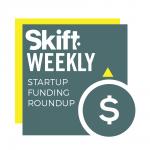Skift Take
Travel startups recently raised more than $184 million in funding. Concepts included intercity bus service, prediction software, corporate travel planning, software for direct hotel bookings, and sites for booking via social media.

Travel Startup Funding This Week
Each week we round up travel startups that have recently received or announced funding. Please email Travel Tech Reporter Justin Dawes at [email protected] if you have funding news.
This week, travel startups announced more than $184 million in funding.
>>Buser, an online booking service for intercity buses in Brazil, has raised $138 million (700 million reais) in a funding round.
LGT Lightrock, Softbank, Monashees, and Valor Capital participated in the round. The travel app now serves nearly 4 million users and it expects a boom in intercity travel once the pandemic recedes.
In Brazil, intercity bus travel is vital. Air and rail operations are either costly or insufficient for many travelers. Meanwhile, most cities are connected by only one bus company, with limited schedules and routes.
The startup, founded in São Paulo in late 2016, plays matchmaker between travelers in Brazil looking to travel between particular cities on particular dates and executive bus charter companies that can respond to the customer demand.
In a related move, investors last month bet big on Germany-based intercity bus startup FlixBus.
>>Clear Secure, the airport screening and biometrics identification company, has filed for an initial public offering with an aspiration to raise at least $100 million from the equity raise on the New York Stock Exchange.
As of today, CEO Caryn Seidman-Becker is a major shareholder. Strategic equity holders include Delta Air Lines with a 5 percent equity stake and United Airlines with less than a 5 percent stake.
Other strategic equity holders in Clear include Liberty Media (owner of Formula 1, the Atlanta Braves, and a one-time investor in Tripadvisor) and Enlighted Hospitality (owner of Danny Meyer’s restaurants and other properties). See Skift’s story on Clear.
>>Collective Retreats, a glamping startup, said it raised $23 million in a Series C funding round.
Fireside Investments led the round. Outdoorsy, a peer-to-peer booking service for recreational vehicles (RVs), took part in the investment round. It plans to tell its RV and campervan renters about hybrid campground offerings run by Collective Retreats.
The Denver-based Collective Retreats has raised $43 million since its founding in 2015. See Skift’s story on the latest fundraising.
>>Nium, a startup backed by Visa, expanded its business-to-business travel payment technology by announcing its intent to acquire Ixaris, a virtual card platform, in the third quarter. The companies did not disclose the transaction value. Nium specializes in cross-border payments. See Skift’s story.
>>Psngr1, a corporate travel planning and management company, raised $5 million in funding.
The New York City-based startup, which offers online travel management services for businesses, didn’t reveal the names of the investors.
>>Zytlyn Technologies, a travel data analytics startup, said on Thursday it had secured $2.5 million in funding.
Backers included Plug & Play Ventures, Century Oak, Geneva Foundation for Technological Innovation (FONGIT FIF), strategic angels such as Elyes Mrad (managing director, Certares), Julia Sattel (formerly of Amadeus), Niels Gron (founder of AquaFold), plus support from the Swiss ICT Investor Club (SICTIC).
Travel involves complex permutations and massive fragmentation, making it hard for executives to picture what’s happening. Zytlyn can help fill in the gaps, said co-founder and CEO Houman Goudarzi.
The Geneva-based startup helps airlines, travel agencies, airports, and hotels analyze and make predictions related to demand patterns, pricing, revenue, and sales. Travel companies don’t have to replace their existing systems but can use Zytlyn alongside their other tools. Customers feed their data into Zytlyn’s data and prediction platform.
The startup uses artificial intelligence and machine learning models to generate real-time, actionable predictive insights for analysts, managers, and executives about consumer, competitor, and market behavior, said Goudarzi.
>>Star Speed Store, a robot maker for hotels in China, has secured about $3 million (19 million renminbi) in a seed round with investors including Innoangel Fund.
The company provides robots that deliver food and other items to guests at hotels. It offers the robots free to hotels and then takes a cut of the guest purchases. ChinaTravelNews first reported on the funding.
>>WhereIsMyTransport, which uses tech and ethnographic research to research public transport use in emerging markets, raised $14.5 million in extended Series A funding.
Naspers Foundry, Cathay AfricInvest Innovation Fund, and SBI Investment led the round. The London-based startup gathers and analyzes information to help decision-makers build the most efficient public transport networks in emerging-market megacities.
>>European Sleeper, a new Dutch railway company dedicated to night trains, raised about $610,000 (€500,000) in seed capital in a crowdfunding campaign with 350 investors. It plans to create its first night train between Brussels and Prague with the Czech private railway operator RegioJet. See Skift’s story on European Sleeper.
>>Selfbook, which offers software to help hoteliers and operators drive more direct bookings, has closed a $2 million seed round.
TenOneTen Ventures, Abstract Ventures, and Better Tomorrow Ventures participated. The
New York City-based startup has now raised $3 million to date.
Hoteliers add some code to their websites and the software integrates with popular booking engines such as Sabre’s Synxis and popular payment methods such as Apple Pay and Google Pay.
Rather than redirects customers to old-school, form-heavy booking templates, the software borrows tricks from retail e-commerce, the company said. It lets customers book packages or add upsells more simply.
>>Campsited, an Irish online booking platform for campgrounds, recently closed a seed round of $3.5 million (€2.9 million) million.
Enterprise Ireland and Motley Fool Ventures led that round.
The Dublin-based startup is now raising a similarly sized round to expand into Germany and other markets. It will also launch recreational vehicle (RV) and campervan rental options and German, Italian, and Spanish-language versions of its site.
>>Luxury Travel Hackers, a travel booking service with the mobile millennial in mind, has secured an undisclosed amount of early-stage funding that Crunchbase estimated at $725,000.
Thomas Mangas of Centerfire Capital made the largest investment. Mangas is the former CEO of Starwood Hotels & Resorts Worldwide.
Luxury Travel Hackers (LTH) is a company that compiles recommended vacations thematically tied to the interests and budget of different types of travelers. It produces travel content with influencers and makes vacations bookable via social media. It strives to have “Hollywood production quality content” for its storytelling, said co-founders Gary Kohn and Katie Warner. LTH plans to offer a membership program.
>>Wantotrip, a trip-planning community, recently raised $72,000 in its seed round of funding from Flat6Labs Tunis.
The startup was founded in Belgium in 2017 by Chahrazed Remadi and Makrem Hermassi. It sells thematic trips designed and run by local experts worldwide.
Skift Cheat Sheet:
We define a startup as a company formed to test and build a repeatable and scalable business model. Few companies meet that definition. The rare ones that do often attract venture capital. Their funding rounds come in waves.
Seed capital is money used to start a business, often led by angel investors and friends or family.
Series A financing is typically drawn from venture capitalists. The round aims to help a startup’s founders make sure that their product is something that customers truly want to buy.
Series B financing is mainly about venture capitalist firms helping a company grow faster. These fundraising rounds can assist in recruiting skilled workers and developing cost-effective marketing.
Series C financing is ordinarily about helping a company expand, such as through acquisitions. In addition to VCs, hedge funds, investment banks, and private equity firms often participate.
Series D, E and beyond These mainly mature businesses and the funding round may help a company prepare to go public or be acquired. A variety of types of private investors might participate.
The Daily Newsletter
Our daily coverage of the global travel industry. Written by editors and analysts from across Skift’s brands.
Have a confidential tip for Skift? Get in touch
Tags: funding, startups, vcroundup
Photo credit: Airplanes at Switzerland's Zurich Airport in 2020. Zurich Airport
